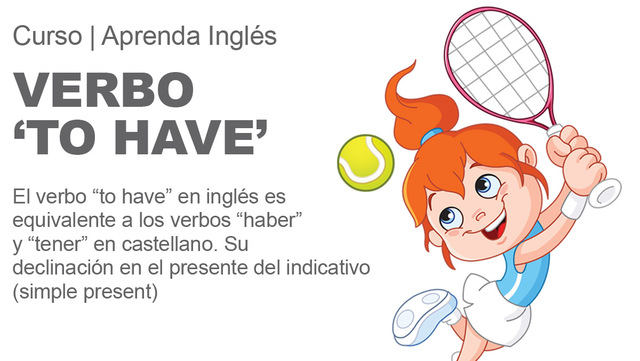VERBO ‘TO HAVE’
El verbo “to have” en inglés es equivalente a los verbos “haber” y “tener” en castellano.
Su declinación en el presente del indicativo (simple present) es la siguiente:
Simple Present del verbo “To Have”
Yo he/tengo I have
Tu has/tienes You have
El/ella ha/tiene He/she/it has
Nosotros hemos/tenemos We have
Ustedes han/tienen You have
Ellos/ellas han/tienen They have
Como contracciones de estas formas se utilizan:
I/you/we/they have I/you/we/they’ve
He/she/it has He/she/it’s
Su declinación en pasado simple (simple past) tiene una única forma:
Simple Present del verbo “To Have”
Yo había/tenía (hube/tuve) I had
Tu habías/tenías (hubiste/tuviste) You had
El/ella había/tenía (hubo/tuvo) He/she/it had
Nosotros habíamos/teníamos (hubimos/tuvimos) We had
Ustedes habían/tenían(hubiste/tuviste) You had
Ellos/ellas habían/tenían (hubieron/tuvieron) They had
El verbo “to have” se puede utilizar como un verbo ordinario y en este caso tiene el significado de “tener”:
I have a car. Yo tengo un coche
She had a boyfriend. Ella tuvo un novio
Y también se utiliza en algunas expresiones con el sentido de “tomar”:
I had a drink after the match. Tomé una bebida después del partido
She has a bath. Ella toma un baño
Como verbo auxiliar, “to have” se utiliza para construir las formas compuestas:
I have read. Yo he leí
He had played tennis. El había jugado al tenis
We have seen a film. Nosotros hemos visto una película
EJERCICIO
- Traduce al inglés las siguientes frases:
1. John tiene un nuevo trabajo.
________________________________
2. ¿Qué tienes en esa maleta?.
________________________________
3. Tengo dos hijas.
________________________________
4. Tienen muchos amigos en España.
________________________________
5. ¿Tienes un minuto?.
________________________________
SOLUCIONES: 1. John has got (has) a new job. 2. What have you got (do you have) in that case? 3. I’ve got (I have) two daughters. 4. They’ve got (They have) a lot of friends in Spain. 5. Have you got (Do you have) a minute?
















